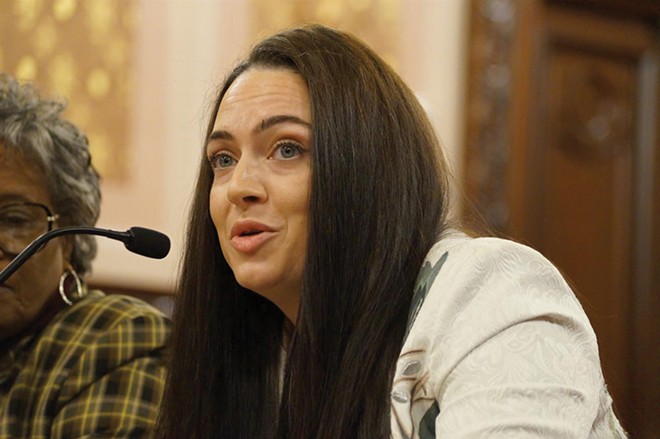
Although Illinois is one of the nation's leading agricultural states, it can still be a challenge for consumers here to shop for food that comes from local farms, dairies and ranches.
The Senate Agriculture Committee heard testimony March 7 on two bills that seek to make Illinois-grown food more accessible to the state's consumers.
Senate Bill 3077, by Sen. Dave Koehler, D-Peoria, would establish a $2 million per-year grant program within the Illinois Department of Agriculture to help fund projects to enhance local food processing, aggregation and distribution within the state. Those could include projects such as food hubs, canneries, mills, livestock processing and other kinds of infrastructure that help move food from a farm to communities.
"And this is important because while we have some of the best farmland in the world, we don't actually have the infrastructure in place to feed ourselves," said Molly Pickering, deputy director of the Illinois Stewardship Alliance. "Ninety-five percent of the food that we eat here in Illinois is imported from out of state. That means every dollar that anyone spends on food is not going into our local communities. It's being exported."
Senate Bill 3219, by Sen. Doris Turner, D-Springfield, would establish another kind of grant program through the Department of Commerce and Economic Opportunity to help fund equipment upgrades at farmer-owned grocery stores.
Stipends for student teachers
A pair of competing bills in the House would, for the first time in Illinois, offer state-funded stipends for student teachers.
Supporters of the idea say it's needed to ease some of the financial burden on teachers-in-training, which some argue is one source of the state's teacher shortage.
Student teaching typically involves a full semester of on-the-job training in a classroom under the supervision of a licensed cooperating teacher. But while student teachers work similar hours as a full-time professional teacher, they are not paid for their labor and, in fact, have to pay full tuition and fees at their college or university to get credit for the experience.
Some districts discourage student teachers from working outside jobs, although many say that's the only way they can make ends meet.
Both bills call for paying stipends of $10,000 for a semester, the rough equivalent of $15 per-hour for 40 hours per week – even though most student teachers say they work much more than that. Assuming an average of 5,400 student teachers per year, that would work out to $54 million in state funding needed to support the program.
The major difference between the two bills is how the program would work in years when lawmakers don't fully fund the program.
House Bill 4652, by Rep. Barbara Hernandez, D-Aurora, does not account for underfunding the program. An initiative of the Illinois Education Association, the state's largest teachers union, it assumes lawmakers would fully fund the stipends each year.
"You all have constituent groups. Our constituency group is our aspiring educators, and they have said they want everyone to be paid for student teaching," IEA lobbyist Unique Mickens told a House committee Wednesday.
House Bill 5414, an initiative of the advocacy group Advance Illinois, calls for paying the same $10,000 stipend to student teachers, plus another $1,500 to cooperating teachers, raising its total price tag to an estimated $67 million per year. But in years of underfunding, it would prioritize recipients on the basis of financial need, then focus on hard-to-fill subjects and areas of the state with the highest teacher vacancy rates.
Both bills are pending in the House Higher Education Committee.
Reducing plastic
People who travel frequently and stay in hotels may have noticed that the small bottles of shampoo, conditioner and body wash have become less common and are being replaced by larger, refillable containers attached to the shower wall.
So far, that's been a trend that the hotel industry has been adopting voluntarily, but it soon could become mandatory in Illinois.
Senate Bill 2960, by Sen. Laura Fine, D-Glenview, would create the "Small Single-Use Plastic Bottle Act" and phase out the use of those items in Illinois hotels. Large hotels with 50 or more rooms would have until July 1, 2025, to comply with the law while smaller hotels would be given one additional year.
Keenan Irish, who lobbies for the Illinois Hotel and Lodging Association, said the industry believes sustainability initiatives like the elimination of single-use plastic are important in demonstrating a commitment to the environment.
"The hotel industry recognizes its responsibility to lead the way in adopting environmentally friendly practices," he told the Senate Environment and Conservation Committee Thursday. "Transitioning away from these bottles is a pivotal stride towards mitigating the environmental harm they cause."
Some on the committee, however, questioned why a law was necessary if the industry was adopting the practice voluntarily.
"Part of the industry is doing it but not all of the industry is doing it," Fine said. "And this will encourage others who are not to hop on board and join us."
The bill advanced out of committee and could be taken up soon by the full Senate.
















